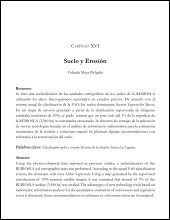LOS ÁCIDOS GRASOS DE LA DIETA AFECTAN LA FISIOLOGÍA REPRODUCTIVA EN LA HEMBRA BOVINA: UNA REVISIÓN
[THE FATTY ACIDS OF DIET AFFECT THE REPRODUCTIVE PHYSIOLOGY IN BOVINE FEMALE: A REVIEW]
| dc.creator | RICARDO ORTEGA PEREZ | |
| dc.creator | JOSE LUIS ESPINOZA VILLAVICENCIO | |
| dc.creator | ALEJANDRO PALACIOS ESPINOSA | |
| dc.creator | MA. OLIVIA ARJONA LOPEZ | |
| dc.creator | ELENA PALACIOS MECHETNOV | |
| dc.date | 2012 | |
| dc.identifier | http://cibnor.repositorioinstitucional.mx/jspui/handle/1001/732 | |
| dc.identifier.uri | http://dspace.cibnor.mx:8080/handle/123456789/1437 | |
| dc.description | "Reproduction is the basis of bovine meat and milk production: As a direct result of reproduction, the cycles of calf and milk production are renewed. However, there are many limiting steps in this process as: low pregnancy rates and long open days that result in increasing parturition intervals. Reproductive efficiency in dairy and beef cattle is multifactorial. Nutrition is one of the most important factors affecting this efficiency, and some results have shown that feeding diverse sources of lipids and specifically, fatty acids (FA) can result in a better reproductive efficiency. As a nutrition strategy to improve reproductive efficiency, FA of the omega 3 (n-3) and omega 6 (n-6) families have been studied, and it has been shown that these FA can control follicular development, production of progesterone in the corpus luteum, and secretion of PGF2α from the endometrium, increasing embryonic survival and pregnancy rates. The purpose of this revision is to analyze the possible mechanisms by which FA in the diet improve reproductive efficiency of cows, with especial emphasis on FA n-3 and n-6." | |
| dc.description | "La reproducción puede ser considerada como el pilar principal de la cadena productiva, tanto para bovinos de carne como de leche. De la reproducción deriva un nuevo becerro para la venta y el comienzo de una nueva lactancia. Sin embargo, hay varias limitantes en el proceso reproductivo tales como: bajas tasas de preñez y períodos prolongados de servicio posparto que traen como consecuencia el aumento del intervalo entre partos. La eficiencia reproductiva en bovinos de leche y de carne es multifactorial y la nutrición es uno de los de mayor influencia. Existen evidencias de que el consumo de grasa y ácidos grasos (AG) en particular pueden mejorar la eficiencia reproductiva de la hembra bovina. Se ha estudiado algunos AG poliinsaturados, principalmente de los tipos omega-3 (n-3) y omega-6 (n-6) y se ha observado que a través de diferentes mecanismos de acción controlan el desarrollo folicular ovárico, la producción de progesterona en el cuerpo lúteo y la secreción de PGF2 del endometrio, favoreciendo la sobrevivencia embrionaria y las tasas de preñez. La presente revisión tiene como objetivo analizar los posibles mecanismos de acción en que la suplementación de AG favorece la eficiencia reproductiva de las vacas, con especial énfasis en los AG n-3 y n-6." | |
| dc.format | application/pdf | |
| dc.language | spa | |
| dc.publisher | Universidad Autónoma de Yucatán | |
| dc.relation | info:eu-repo/semantics/reference/ISSN/ISSN: 1870-0462 | |
| dc.relation | info:eu-repo/semantics/reference/URL/URL: http://www.revista.ccba.uady.mx/ojs/index.php/TSA/issue/archive | |
| dc.rights | info:eu-repo/semantics/openAccess | |
| dc.rights | http://creativecommons.org/licenses/by-nc-nd/4.0 | |
| dc.source | Tropical and Subtropical Agroecosystems | |
| dc.subject | info:eu-repo/classification/AUTOR/Cows, nutrition, fatty acids, reproduction | |
| dc.subject | info:eu-repo/classification/AUTOR/Vacas, nutrición, ácidos grasos, reproducción | |
| dc.subject | info:eu-repo/classification/cti/2 | |
| dc.subject | info:eu-repo/classification/cti/24 | |
| dc.subject | info:eu-repo/classification/cti/2401 | |
| dc.subject | info:eu-repo/classification/cti/240113 | |
| dc.title | LOS ÁCIDOS GRASOS DE LA DIETA AFECTAN LA FISIOLOGÍA REPRODUCTIVA EN LA HEMBRA BOVINA: UNA REVISIÓN | |
| dc.title | [THE FATTY ACIDS OF DIET AFFECT THE REPRODUCTIVE PHYSIOLOGY IN BOVINE FEMALE: A REVIEW] | |
| dc.type | info:eu-repo/semantics/article | |
| dc.type | info:eu-repo/semantics/publishedVersion |
Files in this item
| Files | Size | Format | View |
|---|---|---|---|
|
There are no files associated with this item. |
|||

